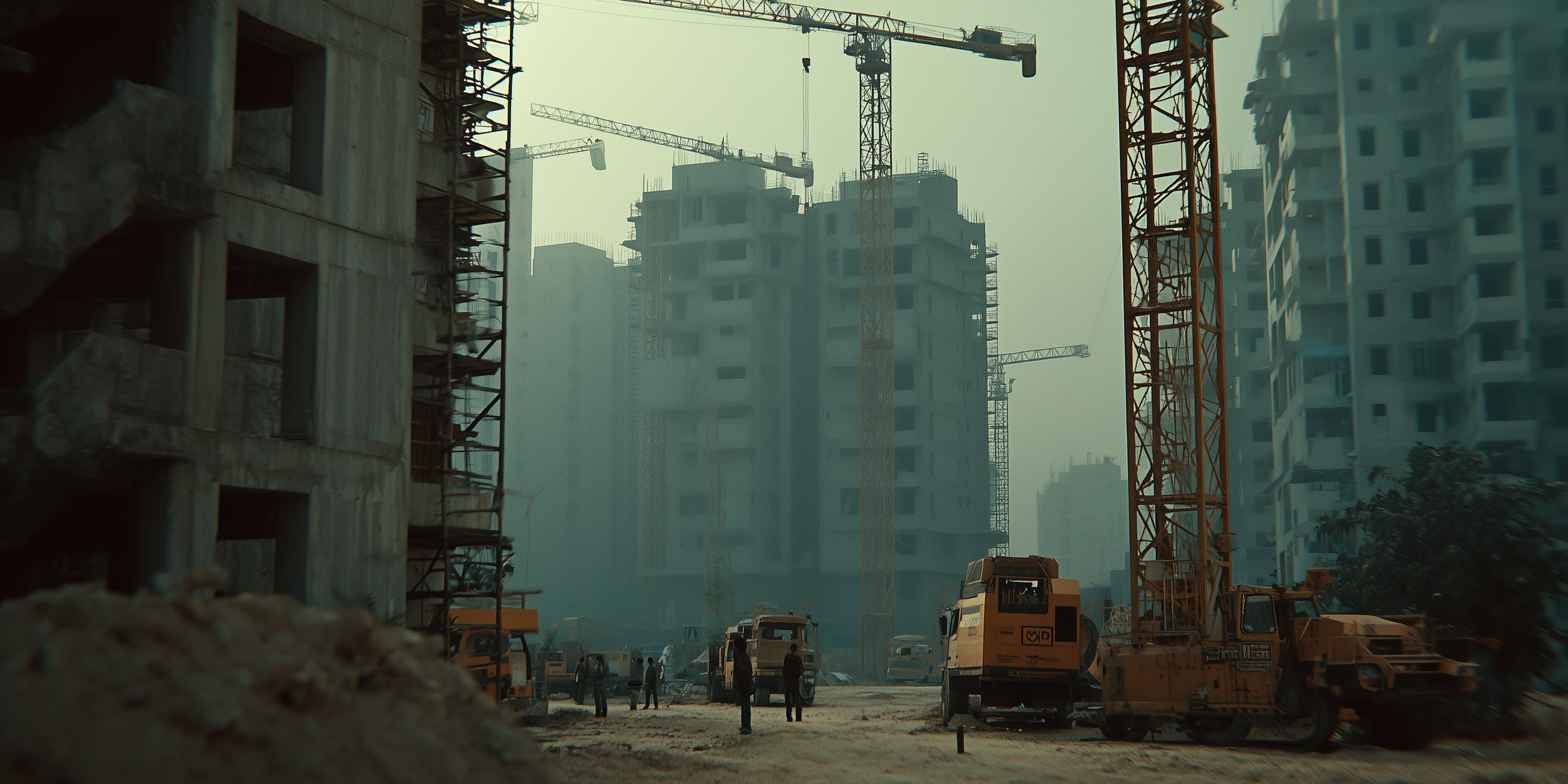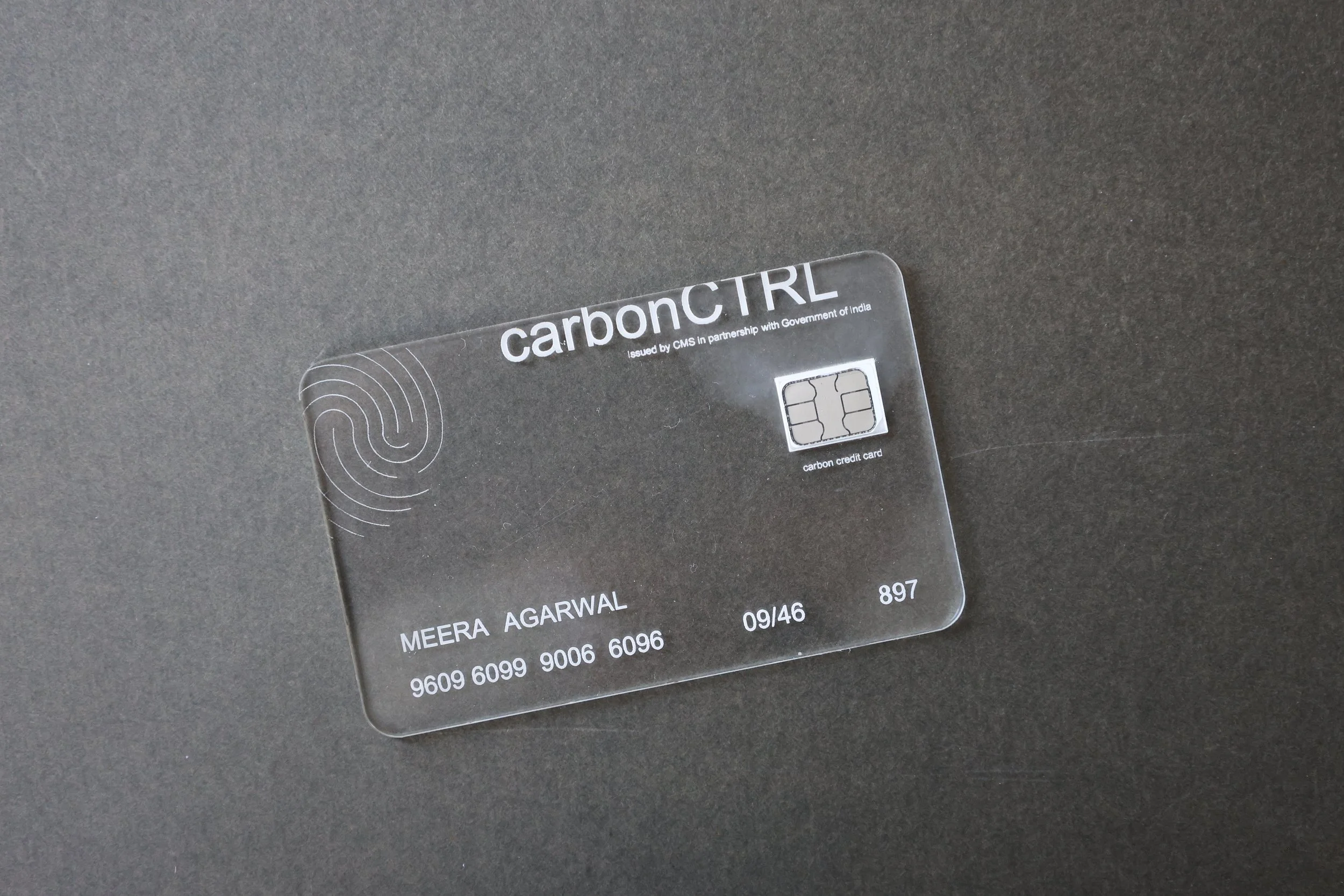SPECULATIVE SYSTEMS
carbonCTRL_SuperFUTURES Platform
Developed as part of the Super Futures platform, Carbon CTRL envisions a near-future scenario where design and governance converge through data-driven carbon monitoring systems. The project speculates on how environmental accountability could evolve into a structured, policy-based network where architecture, technology, and ethics operate within the same framework.
2015
Existing Framework
2025
Policy Launch & CMS Hub in Chandigarh
2030
Early Results & Expansion to Other Cities
HOW MUCH OF THE SUSTAINABLE FUTURE WE ENVISION IS REAL, AND HOW MUCH IS ENGINEERED FOR US TO BELIEVE?
Is the line between Innovation and exploitation thinner than we think?
noun
Launched in 2025, the Greentech Bharat Vision Policy set out to make Tier-2 cities 50% carbon-neutral by 2050, starting with Chandigarh. The CMS hub monitored emissions and promoted green design, reshaping the city’s skyline with solar panels and rooftop gardens.
By 2040, emissions had reportedly fallen by half, but data manipulation and greenwashing revealed cracks in the system. While major firms adapted easily, smaller businesses struggled to keep up.
By 2050, India looked greener yet more divided. The policy sparked innovation but also exposed inequality and questioned whether sustainability built on numbers could ever be truly sustainable.
CARBON CREDIT CARD
SPECIFICATIONS
The Carbon Credit Card is a designed prop created for the film Carbon CTRL. Imagined as a transactional object from a carbon-regulated future, it translates environmental impact into measurable value. Serving as a symbol of systemic control, the card reflects how sustainability might evolve into an economy of accountability and exchange.
GreenTech Bharat Vision policy 2025
green smart construction
/gri:n sma:rt ken’strakfen/
supply chain
a construction industry supply chain that prioritizes environmentally friendly practices throughout the entire process, from sourcing materials to building and disposal, while also utilizing advanced technology and data analytics to optimize efficiency and minimize waste, achieving a sustainable construction approach.
Characters involved-
•Government
•middle class public
•Private Sector Engagement
•Technological Experts
The access ID is a custom prop designed and fabricated for the film. Made from laser-cut wood with engraved detailing and an embedded digital display, it functions as a speculative device that mimics secure authentication to access restricted CMS systems within the narrative.
2040
Full CMS Integration & Widespread Adoption
2050
Nationwide CMS Network & 50% Carbon Neutrality in Tier-2 Cities
ACCESS ID
SPECIFICATIONS
CLICK ON THE POSTER TO VIEW THE FILM
HALFWAY TO ZERO
Socio-Political Drama | Speculative Fiction | Thriller
This film explores the uneasy gap between intention and action — how the pursuit of carbon neutrality can turn into a spectacle of numbers rather than real change. It critiques systems that lose integrity when progress is measured only by metrics. CarbonCtrl questions the narratives we accept, the silence of complicity, and what remains unseen in a world obsessed with visibility.
WHAT HAPPENS WHEN DATA- THE VERY THING THAT HOLDS INDUSTRIES ACCOUNTABLE BECOME A WEAPON? WHO GETS TO DECIDE WHAT “GREEN” REALLY IS?
BECAUSE THIS WORLD EVEN THOUGH I CREATED IS NOT FAR FROM OUR OWN AND MAYBE WE
ALREADY ARE LIVING IN IT’S EARLIEST VERSION.
IF THE SYSTEMS WE TRUST CAN BE REWRITTEN, HOW WILL WE EVER KNOW WHAT’S REAL?
REFLECTION BLOCK
“This project pushed me to question existing systems and imagine futures shaped by design, policy, and ethics. Carbon CTRL became a study in speculative thinking, exploring how design can challenge norms and propose new possibilities for a sustainable world.”
-Arshia
SPECULATIVE SYSTEMS
carbonCTRL_SuperFUTURES Platform
2015
Existing Framework
2025
Policy & CMS Hub Launch
2030
Early Results & Expansion to Other Cities
2040
Full CMS Integration & Widespread Adoption
2050
Nationwide CMS Network & 50% Carbon Neutrality in Tier-2 Cities
Developed as part of the Super Futures platform, Carbon CTRL envisions a near-future scenario where design and governance converge through data-driven carbon monitoring systems. The project speculates on how environmental accountability could evolve into a structured, policy-based network where architecture, technology, and ethics operate within the same framework.
HOW MUCH OF THE SUSTAINABLE FUTURE WE ENVISION IS REAL, AND HOW MUCH IS ENGINEERED FOR US TO BELIEVE?
Is the line between Innovation and exploitation thinner than we think?
GreenTech Bharat Vision policy 2025
green smart construction
/gri:n sma:rt ken’strakfen/
supply chain
noun
a construction industry supply chain that prioritizes environmentally friendly practices throughout the entire process, from sourcing materials to building and disposal, while also utilizing advanced technology and data analytics to optimize efficiency and minimize waste, achieving a sustainable construction approach.
Characters involved-
•Government
•middle class public
•Private Sector Engagement
•Technological Experts
Launched in 2025, the Greentech Bharat Vision Policy set out to make Tier-2 cities 50% carbon-neutral by 2050, starting with Chandigarh. The CMS hub monitored emissions and promoted green design, reshaping the city’s skyline with solar panels and rooftop gardens.
By 2040, emissions had reportedly fallen by half, but data manipulation and greenwashing revealed cracks in the system. While major firms adapted easily, smaller businesses struggled to keep up.
By 2050, India looked greener yet more divided. The policy sparked innovation but also exposed inequality and questioned whether sustainability built on numbers could ever be truly sustainable.
ACCESS ID
SPECIFICATIONS
The access ID is a custom prop designed and fabricated for the film. Made from laser-cut wood with engraved detailing and an embedded digital display, it functions as a speculative device that mimics secure authentication to access restricted CMS systems within the narrative.
CARBON CREDIT CARD
SPECIFICATIONS
The Carbon Credit Card is a designed prop created for the film Carbon CTRL. Imagined as a transactional object from a carbon-regulated future, it translates environmental impact into measurable value. Serving as a symbol of systemic control, the card reflects how sustainability might evolve into an economy of accountability and exchange.
CLICK ON THE POSTER TO VIEW THE FILM
HALFWAY TO ZERO
Socio-Political Drama | Speculative Fiction | Thriller
This film explores the uneasy gap between intention and action — how the pursuit of carbon neutrality can turn into a spectacle of numbers rather than real change. It critiques systems that lose integrity when progress is measured only by metrics. CarbonCtrl questions the narratives we accept, the silence of complicity, and what remains unseen in a world obsessed with visibility.
WHAT HAPPENS WHEN DATA- THE VERY THING THAT HOLDS INDUSTRIES ACCOUNTABLE BECOME A WEAPON? WHO GETS TO DECIDE WHAT “GREEN” REALLY IS?
BECAUSE THIS WORLD EVEN THOUGH I CREATED IS NOT FAR FROM OUR OWN AND MAYBE WE ALREADY ARE LIVING IN IT’S EARLIEST VERSION.
IF THE SYSTEMS WE TRUST CAN BE REWRITTEN, HOW WILL WE EVER KNOW WHAT’S REAL?
REFLECTION BLOCK
“This project pushed me to question existing systems and imagine futures shaped by design, policy, and ethics. Carbon CTRL became a study in speculative thinking, exploring how design can challenge norms and propose new possibilities for a sustainable world.”
-Arshia



















